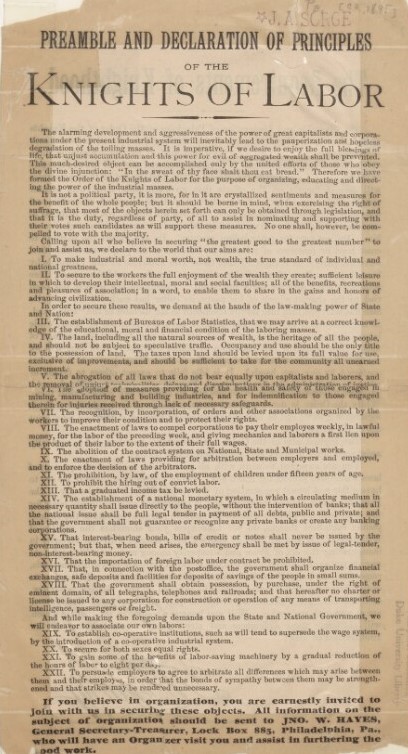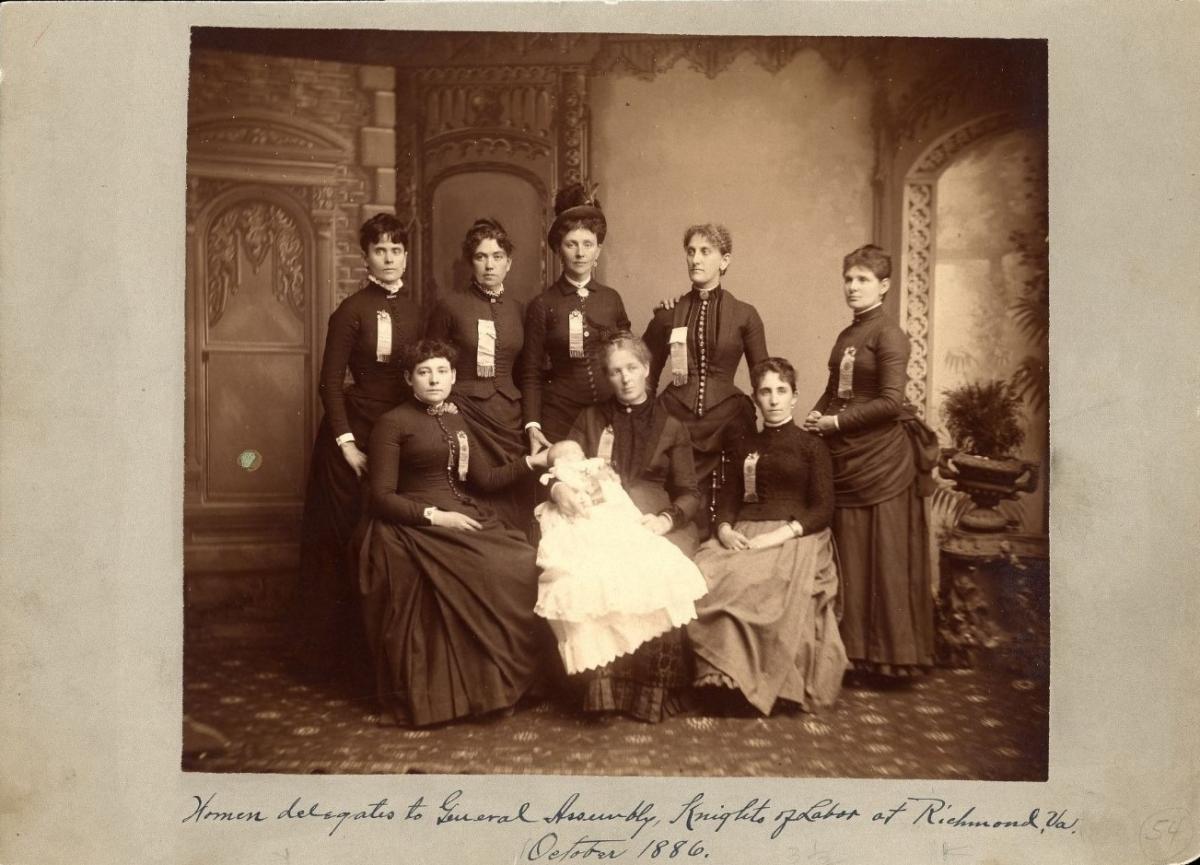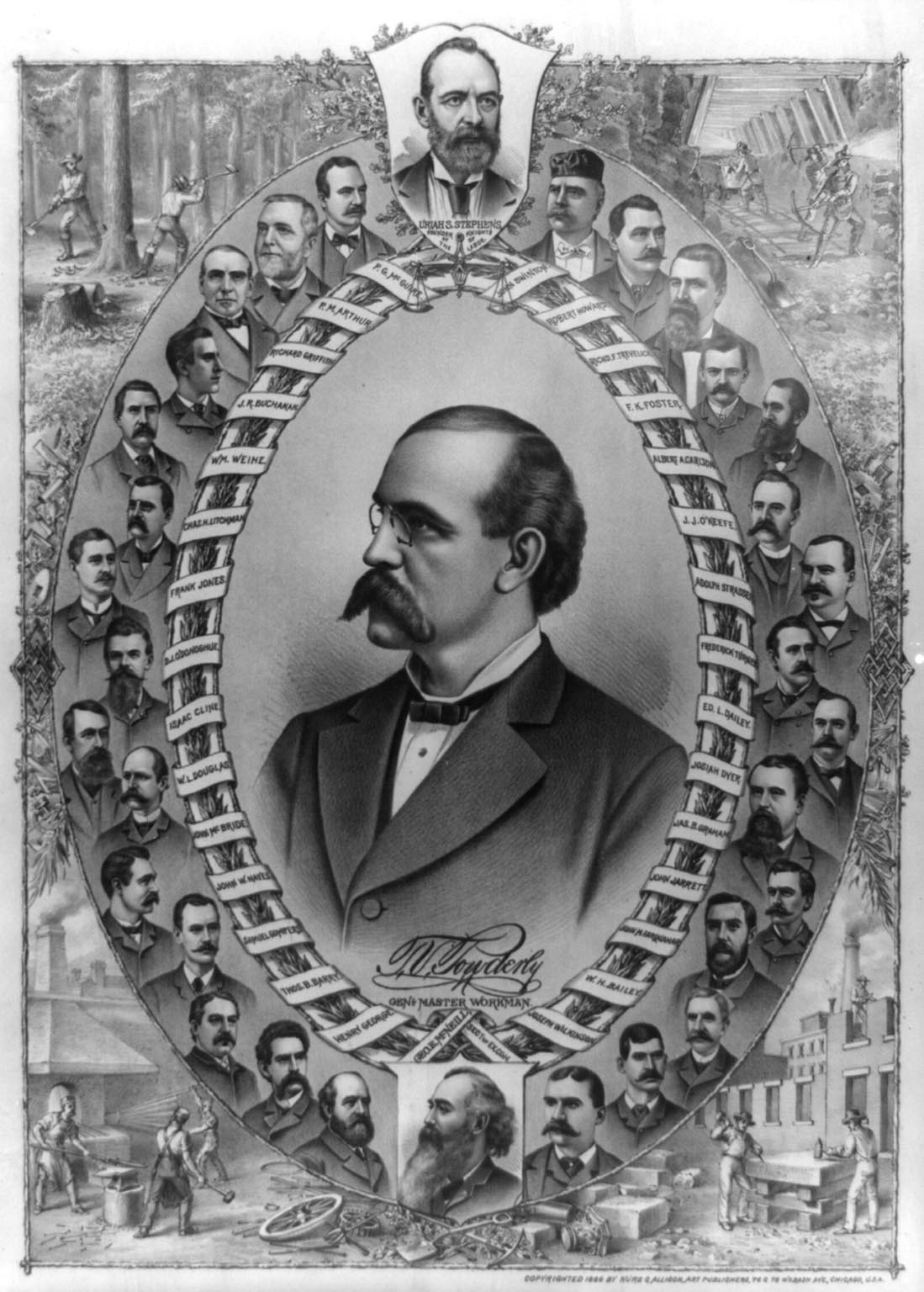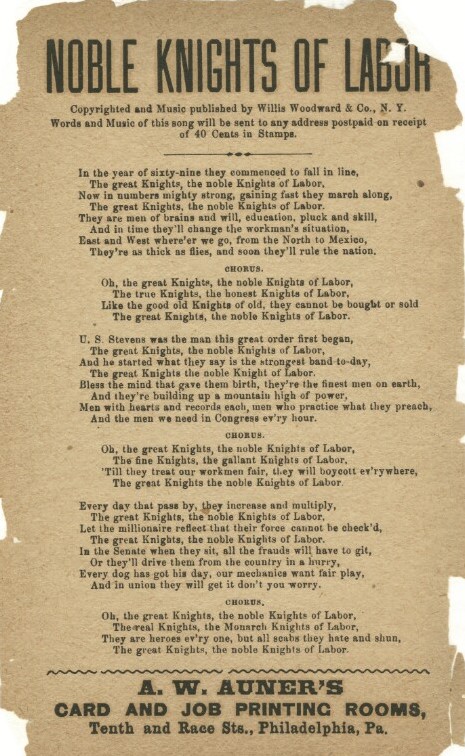During the late nineteenth century, many workers joined unions in hopes of improving their working conditions and wages. In just three years between 1877 and 1880, the number of national unions grew from three to eighteen.
The Knights of Labor was one early labor union, organized in Philadelphia in 1871 by garment cutters. In its early days, the Knights of Labor was a a secret society, which fueled rumors in the press that they were dangerous or violent. The rumors were encouraged by factory owners who feared that organization of their workers would lead to strikes.
Within a few years, the Knights of Labor expanded and allowed all workers to join. In 1878, they released this public statement about the goals of their society. No longer a secret society, the Knights of Labor grew into one of the largest labor unions in the United States. By 1886, the Knights of the Labor boasted 500,000 members.
In this 1878 statement of goals, the Knights of Labor expressed concern about the accumulation of wealth by some people and the possible "pauperization," or impoverishment, of workers. It called for the reduction of the workday to 8 hours; the prohibition of the employment of children under age fifteen in factories, workshops, and mines; equal pay for men and women; and other labor laws that we take for granted today. It also called for the use of arbitration, or negotiations, rather than strikes, to settle labor disputes.
The Knights of Labor opened its first assembly in Raleigh in 1884 and expanded into most counties in North Carolina, but made little progress toward its goals in the state. Resistance from business managers limited its effectiveness. In addition, the fact that the union was open to both whites and blacks made it unpopular among many white southerners, who resisted the idea of social equality between blacks and whites.
Preamble and Declaration of Principles of the Knights of Labor
The alarming development and aggressiveness of great capitalistsHere a "capitalist" is someone who controls capital, the money and equipment needed for production, and who therefore controls the earnings of industry. and corporations, unless checked, will inevitably lead to the pauperization and hopeless degradation of the toiling masses. It is imperative, if we desire to enjoy the full blessings of life, that a check be placed upon unjust accumulation, and the power for evil of aggregated wealth. This much-desired object can be accomplished only by the united efforts of those who obey the divine injunction, "In the sweat of thy face shalt thou eat bread."This is (among other things) what God said to Adam and Eve when he threw them out of the Garden of Eden (King James Bible, Genesis 3:19). In Eden, they had not had to work for their food; now God was saying that they would now have to work for their food. The Knights of Labor were saying that industrial workers were obeying God's commandment -- but they implied that, by contrast, factory owners did not, because the owners merely profited from the sweat of others. Therefore we have formed the Order of the Knights of Labor, for the purpose of organizing and directing the power of the industrial masses, not as a political party, for it is moreLabor unions are often formally called "brotherhoods," and early labor unions genuinely meant that workers should be like brothers to one another. This is what the Knights of Labor meant by being "more" than a "political party" -- though politics would be necessary to achieve what they wanted. -- in it are crystalized sentiments and measures for the benefit of the whole people, but it should be borne in mind, when exercising the right of suffrage, that most of the objects herein set forth can only be obtained through legislation, and that it is the duty of all to assist in nominating and supporting with their votes only such candidates as will pledge their support to these measures, regardless of party. But no one shall, however, be compelled to vote with the majority, and calling upon all who believe in securing the greatest good to the greatest number, to join and assist us.
Declaration of Principles
We declare to the world that our aims are:
- To make industrial and moral worth, not wealthPeople should be judged and valued not by how much money they have, but by their morality and how well they work (their "industrial worth")., the true standard of individual and national greatness.
- To secure to the worker the full enjoyment of the wealth they create, sufficient leisureLabor organizers believed that people who worked 12- and 14-hour days could not possibly develop their full potential as human beings -- they could not educate themselves or appreciate the "finer things," and they would be too tired and hard-worked to be moral people and good citizens. This was one of their arguments for setting limits on the length of workdays and workweeks. in which to develop their intellectual, moral and social faculties; all of the benefits, recreation and pleasures of association; in a word, to enable them to share in the gains and honors of advancing civilization.
In order to secure these results we demand of the State"The State" with a capital S usually refers to the nation and its government in a general, formal way.:
- The establishment of bureaus of labor statisticsA Bureau of Labor was established as part of the Department of the Interior in 1884. The U.S. Department of Labor would be established in 1913, and collecting data and statistics on labor would be part of its mission., that we may arrive at a correct knowledge of the educational, moral, and financial condition of the laboring masses.
- That the public lands, the heritage of the people, be reserved for actual settlersThe Homestead Act of 1862 gave western lands owned by the U.S. government to anyone who would farm them. Any U.S. citizen or newly arrived immigrant could obtain 160 acres of land in the West if this "homesteader" agreed to live on it, grow crops, and build a house. But thousands of acres were sold for little money to speculators -- people who held onto the land in hopes of reselling it at a higher price after railroads were built. Much of the land was bought by railroad companies themselves.; not another acre for railroads or speculators, and that all lands now held for speculative purposes be taxed at their full value.
- The abrogation of all laws that do not bear equally upon capital and laborIn the nineteenth century, unions had no legal standing and striking workers had no legal protection. Today, unions certified by the federal government have guaranteed rights and protections., and the removal of unjust technicalities, delays, and discriminations in the administration of justice.
- The adoption of measures providing for the health and safety of those engaged in mining, manufacturing, and building industries, and for indemnification to those engaged therin for injuries received through lack of necessary safeguards.
- The recognition by incorporation of trades unions, orders, and such other associationsUnions wanted to have the same legal standing that a business corporation did. as may be organized by the working masses to improve their condition and protect their rights.
- The enactment of laws to compel corporations to pay their employees weekly in lawful money for the labor of the preceding week, and giving mechanics and laborers a first lien upon the product of their labor to the extent of their full wages.
- The abolition of the contract system on national, state, and municipal works.
- The enactment of laws providing for arbitration between employers and employedArbitration is a means of settling disputes in which two sides agree to argue their case before a neutral person, the arbitrator, and that they will accept the arbitrator's decision. Binding arbitration is arbitration in which both sides are legally required to obey the arbitrator's decision. Unions wanted arbitration between labor and management to settle disputes over wages and working conditions so that they could avoid strikes, which not only prevented workers from earning money but often led to violence when factory owners called police or private detectives to break them up., and to enforce the decision of the arbitrators.
- The prohibition by law of the employment of children under fifteen years of age in workshops, mines and factories.
- To prohibit the hiring out of convict laborPrisons hired convicted criminals out to do work at low wages. Unions argued that this was unfair competition with free men..
- That a graduated income taxThe graduated income tax is the income tax that the U.S. and most states have today, in which people with higher incomes pay a higher percentage of it in taxes. In 1895, the Supreme Court ruled that Congress did not have the power to tax people's incomes, but the Sixteenth Amendment to the U.S. Constitution would give Congress that power in 1913. be levied.
And so demand at the hands of Congress:
- The establishment of a national monetary systemItems 1, 2, and 4 in this list ask the U.S. Government to issue paper money and to nationalize, or take over, the banking system, so that banks and money would be run for the interests of the common people rather than for the interests of the wealthy., in which a circulating medium in necessary quantity shall issue direct to the people, without the intervention of banks; that all the national issue shall be full legal tender in payment of all debts, public and private; and that the government shall not guarantee or recognize any private banks, or create any banking corporations.
- That interest-bearing bonds, bills of credit, or notes shall never be issued by the government, but that, when need arises, the emergency shall be met by issue of legal tender, non-interest-bearing money.
- That the importation of foreign labor under contract be prohibitedImmigrants could be brought in under contract to particular factories and would work at lower wages than workers already in the U.S. Again, the Knights were asking for limits on what they saw as unfair competition..
- That, in connection with the post-office, the government shall organize financial exchanges, safe deposits, and facilities for the deposit of the savings of the people in small sums.
- That the government shall obtain possession, by purchase, under the right of eminent domain, of all telegraphs, telephones, and railroads, and that hereafter no charter or license be issued to any corporation for construction or operation of any means of transporting intelligence, passengers or freight.
And while making the foregoing demands upon the State and national government, we will endeavor to associate our own labors to:
- To establish co-operative institutionsA cooperative business is one owned by its workers, who share in its profits., such as will tend to supercede the wage system, by the introduction of a co-operative industrial system.
- To secure for both sexes equal pay for equal workThis was not established as federal law until 1963, when Congress passed the Equal Pay Act..
- To shorten the hours of labor by a general refusal to work for more than eight hoursCongress would limit the work day to 8 hours in the Fair Labor Standards Act of 1938..
- To persuade employers to agree to arbitrate all differences which may arise between them and their employees, in order that the bonds of sympathy between them may be strengthened, and that strikes may be rendered unnecessary.
Primary Source Citation:
Preamble and declaration of principles of the Knights of Labor. 1878. David M. Rubenstein Rare Book & Manuscript Library, Broadsides and Ephemera Collection, Duke University Libraries, Durham, N.C. https://idn.duke.edu/ark:/87924/r4668bt1d




